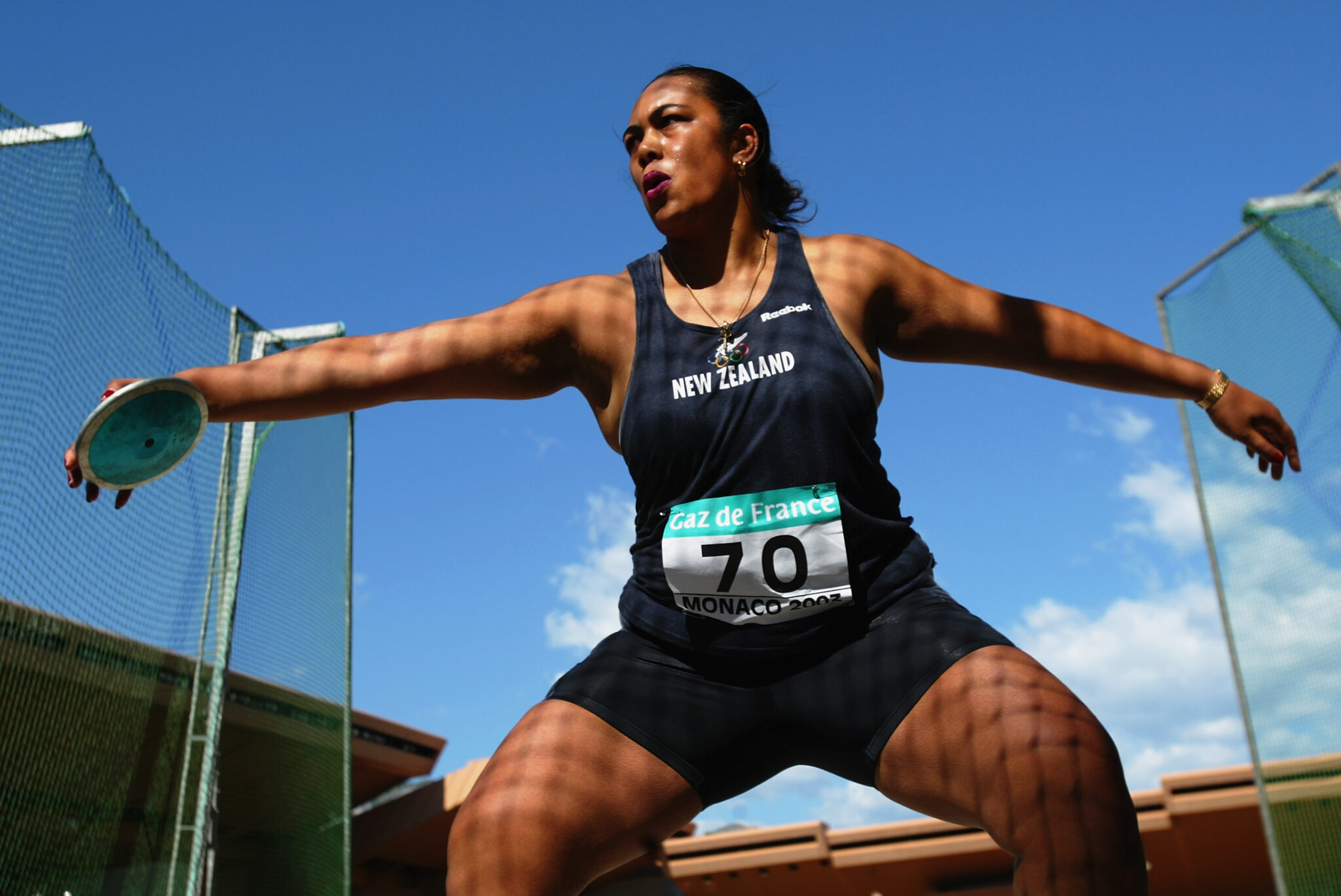News & Updates
Beatrice Faumuina – Time Tunnel

Beatrice Faumuina created history at the 1997 World Athletics Championships in Athens by becoming the first kiwi champion and medallist in the history of the championships. Credit: (Getty Images).
Beatrice Faumuina claimed New Zealand’s first World Athletics Championships medal gold in the women’s discus at the 1997 event in Athens. The Aucklander reflects on a very special moment in the history of athletics in Aotearoa.
It is hard to believe that just 12 months prior to her World Championships victory inside the cavernous Athens Olympic Stadium that Beatrice Faumuina threatened to walk away from the sport.
Devastated to underperform at the 1996 Atlanta Olympics, when she finished a distant 23rd and missed out in advancing to the final, she was all set to quit the sport.
Yet it was the wise words of her mum, which acted as the trigger to banish such thoughts.
“When I told my mum I was thinking of quitting she said, ‘you have to make a choice. If you walk away from this, at no point are you ever going to have a conversation with me wishing you had stayed’,”
After pondering her mother’s words, she found fresh motivation and the resilience to carry on.
“The disappointment fuelled me to get it right in 1997, and I returned to training very quickly after the Olympics thinking, I never wanted to feel like this again.”
Committing to the sport with a renewed sense of purpose the Aucklander was determined to perform much better at her next major target – the 1997 World Athletics Championships in Athens.
Training seven days a week under the guidance of coach, Les Mills, the former Commonwealth discus champion, Beatrice was determined to put all the components in place to reach a peak in the Greek capital.
“I saw my strength levels go up in the weights room, the best of what I had in 1996 was completely different to in 1997,” she explains. “It was exciting to feel the change.”
Training alongside a top-class training partner in the shape of Ian Winchester, a former New Zealand men’s discus record-holder, she also tapped into the expertise of German biomechanist Klaus Bartonietz.
“It was quite pivotal working with Klaus,” recalls Beatrice. “To have that technical eye come in to support my training was another chapter in the change that was happening. He critiqued a few things, but I felt like I was operating in an environment where all those pieces of the puzzle were coming together, and I was getting ready to compete.”
The early signs in 1997 were promising. Impressing domestically, she set a PB of 64.66m to win at the Robin Tait Classic in Auckland in January but knew in early March she faced a much bigger challenge when taking on 1990 Commonwealth discus champion Lisa-Marie Vizaniari at the Australian Championships.
In Melbourne, Beatrice elevated herself to a world-class level, hurling the 1kg discus out to a mighty PB of 68.28m to claim a hugely confidence-boosting win.
Moving on to the next challenge, the Kiwi, who had made her international breakthrough when winning a Commonwealth silver medal at the 1994 Victoria Games, acknowledged she needed to back up this performance in Europe.
Targeting the world-class Bislett Games meet in Oslo in early July of that year she put together an outstanding series in the Norwegian to beat a clutch of the world’s best athletes to gold with a PB of 68.52m – a mark which still stands as the New Zealand record today. It was a huge moment in her preparation for Athens and transformed the Kiwi from the hunter to the hunted.
“The whole competition from round one was incredible it was one of the best series I’d ever put together,” she explains. “To do so in Oslo, which was a key event for me ahead of the World Championships, ticked many boxes. It showed I could compete against the best in the world at a leading IAAF (now World Athletics) event. I was ready, it was now just about maintaining, keeping the rhythm, and getting ready for Athens.”
Excited to perform at her second World Championships, on a whole new level to the athlete who had placed 27th at the previous edition two years earlier in Gothenburg, the proud New Zealander was also enthused to compete in such an historical city.
Yet her hopes of success teetered on the precipice after she registered fouls with her first two throws in qualification with just one throw remaining to advance to the final. A younger less mentally robust Beatrice may have struggled to cope but the 1997 version responded magnificently to the pressure.
“I remember watching Lars Riedel (the German discus thrower and 1996 men’s Olympic discus champion) foul with his first two throws in Atlanta before he delivered in round three (of the final), so we simulated in training having one throw to qualify. Ahead of my third attempt in qualification I just said to myself to relax and keep calm. I’d done all the training, I just needed to maintain the self-belief to make it happen.”
The strategy worked. The discus flew out to 64.58m as she advanced with the fourth best throw in qualification to the final, which took place two days later.
Just like the qualification, the final did not run perfectly. Once again, she registered fouls with her first two throws but a third round 66.82m elevated her into provisional gold.
“The discus just stayed in the sector and the feeling was one of relief,” she says. “I knew I just had to stay smooth and maintain my rhythm.” Beatrice fired the discus out to 62.60m in round four followed by fouls in round five and six. But the powerful East European challenge could not surpass her. Elina Zvereva of Belarus with 65.90m and Russian Natalya Sadova with a best of 65.14m could only claim the minor medals – Beatrice was champion of the world.
“My mother has travelled from the other side of the world to watch me,” says Beatrice.
“In the stadium we hugged and cried, and I was presented my medal by Sir Arthur Eustace (an iconic New Zealand athletics coach) which was very special.”
Beatrice went on to enjoy a top-quality career winning back-to-back gold medals at the 1998 and 2002 Commonwealth Games. She went on to claim two more top five finishes at the World Championships and a sixth place spot at the Athens Olympics but she will forever be remembered for her stunning efforts in Athens.
Today working as a High Performance Academy Manager at Barfoot and Thompson and a director at Sport NZ and Trusts Arena she leads a busy and a full life. But she fully acknowledges the vital role her World Championship success played in her life.
“So many good things opened up for me in terms of career options from that victory,” she explains. “It was an incredibly special time and a wonderful moment which I still today get to talk and reminisce about.”
